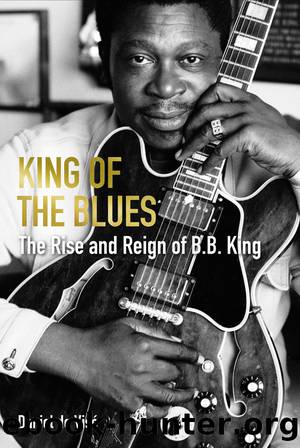King of the Blues by Daniel De. Vise

Author:Daniel De. Vise [Vise, Daniel De.]
Language: eng
Format: epub
ISBN: 9781611856545
Google: lLgszgEACAAJ
Publisher: Grove/Atlantic, Incorporated
Published: 2021-10-15T23:40:41.390520+00:00
CHAPTER 14
MYTHOLOGY
B.B. HAD RECEIVED STANDING OVATIONS before in his forty-one years, but always at the end of a performance, never the beginning. Now he stood on the Fillmore stage, tears streaming down his cheeks, facing a kaleidoscope army of hippies whose cheers rang louder than any of the music that would fill the hall that Sunday.
Carlos Santana, the guitarist from Tijuana, stood in the audience and beheld his hero through the smoky glare. âThe light was hitting him in such a way that all I could see were big tears coming out of his eyes, shining on his black skin,â Santana recalled. âHe raised his hand to wipe his eyes, and I saw he was wearing a big ring on his finger that spelled out his name in diamonds. Thatâs what I remember mostâdiamonds and tears, sparkling together.â
B.B. had feared this audience would give him nothing. Instead, the fans were giving him everything. He wondered how he could possibly answer such an outpouring. He led the band into âEvery Day I Have the Blues.â The answer would come in his music.
âI played that night like Iâve never played before,â B.B. recalled. He fed on the energy of his audience, an interaction not unlike the feedback loop between guitar and amplifier that provided Lucille her signature sound. B.B. had been allotted forty-five minutes but played for nearly an hour and a half. All the while, the audience remained on its feet, dancing and leaping, screaming and clapping, frigging, fragging, and frugging. The cheering never really stopped.
âIt was hard for me to believe that this was happening,â B.B. recalled, âthat this communication between me and the flower children was so tight and right.â
Peter Lewis, the Moby Grape guitarist, watched from the wings. âThe kids were tripping out under these strobe lights,â he recalled. âAnd heâs playing blues like heâs in a smoky bar. He fit. Thatâs what I remember about that night. He fit. He was perfect.â
B.B.âs jaded sidemen never paused to appraise the moment. To them, the Fillmore was one more stop on an unending tour, much like that chilly night at the Regal back in 1964. âI guess for most of us in the band, it was just another gig,â recalled Duke Jethro, the organist. âExcept that the audience was different. I remember psychedelic lights and all that. I wasnât paying attention to a lot, except girls.â
Nonetheless, when the pot smoke had cleared, B.B. King stood revealed as the greatest blues musician of his time. Perhaps the hippies hadnât recognized him as he stumbled through the crowd, searching for the refuge of a dressing room and a bottle of scotch. But they recognized his sound, for it was the sound of Eric Clapton and Mike Bloomfield, their rock-guitar idols. And they recognized his name, a name B.B.âs white acolytes had been chanting in San Francisco and Los Angeles and London. That Sunday night, B.B. bade farewell to the chitlinâ circuit, vacating the fringe genre of blues to join the mostly white and male fraternity of rock music.
Download
This site does not store any files on its server. We only index and link to content provided by other sites. Please contact the content providers to delete copyright contents if any and email us, we'll remove relevant links or contents immediately.
Kathy Andrews Collection by Kathy Andrews(11817)
The remains of the day by Kazuo Ishiguro(8982)
Spare by Prince Harry The Duke of Sussex(5184)
Paper Towns by Green John(5182)
The Body: A Guide for Occupants by Bill Bryson(5084)
Industrial Automation from Scratch: A hands-on guide to using sensors, actuators, PLCs, HMIs, and SCADA to automate industrial processes by Olushola Akande(5056)
Machine Learning at Scale with H2O by Gregory Keys | David Whiting(4299)
Be in a Treehouse by Pete Nelson(4041)
Never by Ken Follett(3941)
Harry Potter and the Goblet Of Fire by J.K. Rowling(3849)
Goodbye Paradise(3803)
The Remains of the Day by Kazuo Ishiguro(3400)
Into Thin Air by Jon Krakauer(3387)
Fairy Tale by Stephen King(3374)
The Cellar by Natasha Preston(3335)
The Genius of Japanese Carpentry by Azby Brown(3294)
120 Days of Sodom by Marquis de Sade(3267)
Reminders of Him: A Novel by Colleen Hoover(3098)
Drawing Shortcuts: Developing Quick Drawing Skills Using Today's Technology by Leggitt Jim(3075)
